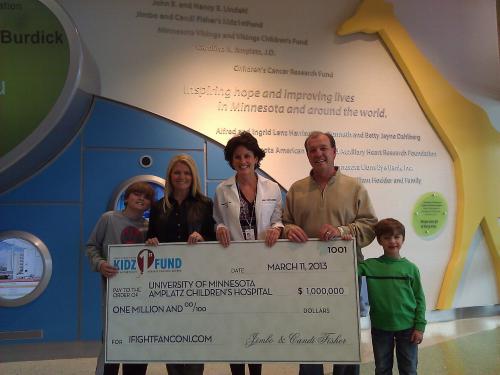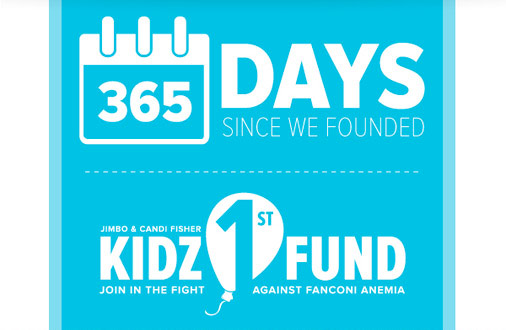Florida State head football coach Jimbo Fisher and his wife, Candi, presented the check during Saturday’s Gophers basketball game.
By Andrew Krammer
March 5, 2012
The Gophers men’s basketball faithful gave a standing ovation Saturday during the team’s Big Ten regular season finale against Nebraska — and it had nothing to do with the team’s 81-69 victory.
Florida State football coach Jimbo Fisher and his family presented the University of Minnesota’s Amplatz Children’s Hospital with a check for $500,000 for Fanconi anemia research during the first half of the game.
Fanconi anemia is a rare, inherited blood disorder that affects roughly one in every 300,000 children.
The Fishers’ son, Ethan, was diagnosed with the disorder last spring in their home state of Florida. Ethan Fisher was on hand Saturday, along with mother, Candi, and his brother, Trey.
The Fisher’s presented their donation alongside former Florida State and current Minnesota Vikings quarterback Christian Ponder, Gophers men’s basketball coach Tubby Smith, University President Eric Kaler and leading University Fanconi anemia researchers Margaret MacMillan and John Wagner, among others.
The $500,000 doubles the University’s current research budget for Fanconi anemia.
“What research does is give hope,” MacMillan said. “What you want to know is that it is going to get better.”
This is the first major donation from the Kidz1stFund, which the Fishers established in August with the goal of funding a cure for Fanconi anemia.
The University of Minnesota takes care of more Fanconi anemia patients than any other hospital in the country, MacMillan said. But Kidz1stFund’s tight budget has relied on volunteer hours to fuel research.
“This will allow us to fund the current research,” MacMillan said. “A lot of the Fanconi anemia research we’re doing is unfunded — stuff our researchers have to do on the side.”
Ethan first visited the University and MacMillan in April for consultation, and the Fisher family quickly decided they wanted their son treated at the University’s Amplatz Children’s Hospital.
“We did a lot of research and discovered their operating budget wasn’t, in medical terms, a very large one,” Candi Fisher said. “They were operating on quite a shoe-string budget. We feel like what we’re going to give Saturday will hopefully be a game changer. And it’s just the beginning.”
The Fishers’ trip to Minnesota also included a meeting Sunday to discuss the use of the funds and meet the rest of the physician team. They also have appointments Monday and Tuesday to serve as Ethan’s one-year checkup since his diagnosis.
“This trip is obviously two-fold for us,” Candi Fisher said. “But, we hope to not only benefit Ethan [with the donation], but all the children who are affected by this disease.”
Specifically at the University, the survival rate 15 years ago for a patient needing an unrelated donor transplant was around 20 percent, MacMillan said. In 2012, the same transplant has an 85-percent survival rate at the University, she said.
“$500,000 sounds like a lot, and it definitely is a lot of money,” MacMillan said. “But it will be eaten up quickly. We would love to see that this is the beginning of something.”
With so much support in the first seven months of fundraising, the Fishers and the Kidz1stFund are already working on fundraising efforts for the upcoming football season.
Rebecca Kill, wife of Gophers football coach Jerry Kill, was also in attendance for the check presentation Saturday. Jerry Kill was with Mia Gerold, a 10-year-old with brain cancer, during a Make-A-Wish event Saturday.
“I wish I could be there,” Jerry Kill said in a statement. “There are so many people, many of them these young kids, who are battling things that are very difficult. It’s good to see people reaching out and helping each other to get through the tough times. It’s not easy for those kids and their families.”
MacMillan said athletics serves as an important window, not only to Fanconi anemia research, but to the University of Minnesota’s researching efforts in general, and that the Fishers’ efforts will serve as a learning platform for fundraising in the future.
While personal privacy is important, MacMillan said it is important for high-profile figures like the Fishers to use their name to promote fundraising for cures.
“I really give both Jimbo and his wife Candi a lot of credit for being able to talk about this openly and to allow everyone into a very difficult part of their life,” she said. “But by doing so, they understand they are reaching an audience of many people that would like to help.”
“It’s so rare that it is hard to get funding for,” MacMillan said. “That’s the bottom line.”
Source: Minnesota Daily



